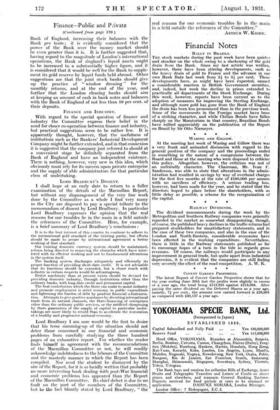LORD BRADBURY'S DISSENT.
I shall hope at an early -date to return to a fuller examination of the details of the Macmillan Report,' but without any disparagement of the very fine work done by the Committee as a whole I find very many in the City are disposed to pay a special tribute to the memorandum of dissent by Lord Bradbury. In particular Lord Bradbury expresses the opinion that the real reasons for our troubles lie in the main in a field outside the references of the Committee. Here, for example, is a brief summary of Lord Bradbury's conclusions :
It is to the best interest of this country to continue to adhere to the international gold standard of the existing parity, but efforts should be made to secure by international agreement a better working of that standard.
Our existing domestic currency system should be maintained, reform being directed to removing the obitacles which have inter- feted with-its efficient working and not to fundamental alterations in the system itself.
The banking system discharges adequately and efficiently its proper function of providing short-date credit. It is not advisable that its functions should be extended, but a closer touch with industry in certain respects would be advantageous.
Better machinery than at present exists should be devised for proViding domestic industry, through institutions other than the ordinary banks, with long-date credit and permanent capital. The best contribution which the State can make to assist industry and promote employment is strict economy in public expenditure and lightening the burden of debt by prudent financial administra- tion. Attempts to give positive assistance by diverting international trade from its natural channels, the State-financing of enterprises other than the ordinary public services, or the artificial cheapening by State guarantees of the supply of capital to particular under- takings are more likely to retard than to accelerate the restoration of a healthy and progressive national economy.
Lord Bradbury I am sure would be the first to desire that his terse summing-up of the situation should not deter those 'concerned in our financial and economic problems from carefully studying the three hundred pages of an exhaustive report. For whether the reader finds himself in agreement with the recommendations of the Macmillan Committee or not, he will readily acknowledge indebtedness to the labours of the Committee and the masterly manner in which the Report has been compiled. Nor need the student be dismayed by the site of the Report, for it is so lucidly written that probably no more interesting book dealing with post:War financial and economic problems has appeared than the Report of the Macmillan Committee. Its chief defect is due to no fault on the part of the members of the Committee, but to the fact bluntly stated by Lord Bradbury, " the real reasons for our economic troubles lie in the ma in in a field outside the references of the Committee."
ARTHUR W. KIDDY.


































 Previous page
Previous page